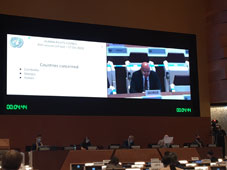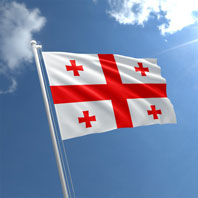
Human Rights situation in Georgia’s occupied regions discussed at 45th session of the UN Human Rights Council
By Khatia Bzhalava
Thursday, October 8
On October 5th, within the framework of the 45th session of the United Nations Human Rights Council, the Report of the United Nations High Commissioner for Human Rights on cooperation with Georgia was reviewed. The report addresses the situation of human rights in and around Abkhazia and South Ossetia. Alexandre Maisuradze, permanent representative of Georgia to the UN Office and other International Organizations in Geneva delivered a statement at the session, introducing to the member states of the United Nation the harsh humanitarian and human rights situation in Russian occupied Abkhazia and the Tskhinvali region. The information is published by the Ministry of Foreign Affairs of Georgia.
According to the statement of the ministry (MFA), Maisuradze pointed out that regardless of the COVID-19 pandemic, the Russian Federation proceeds to carry out destabilisation by intensifying the unlawful process of erecting wires along the occupation line.. He noted that Russia’s refusal to emergency medical evacuation as well as the closure of so-called passages resulted in the deaths of innocent people. As stated, 15 Georgians have died to date, since the occupation line was closed in September of last year.
Maisiradze focused attention on the fact of wounding and illegal detention of Georgian citizen Zaza Gakheladze by Russian-led forces. According to him, opening fire on local civilians is another example of gross violation of the 2008 ceasefire agreement by Russia as well as a complete disregard of the UN’s Secretary-General’s appeal for a global ceasefire.
As the statement reads, the permanent representative of Georgia noted that the Russian Federation undermines the process of conflict resolution and hinders Geneva International Discussion process as well as the work of incident prevention and response mechanism.
Maisuradze called on Russia to fulfill obligations under the 2008 ceasefire agreement. He also emphasised the need for monitoring of the human rights situation in the occupied territories and the admission of international organisations, ‘primarily the Office of the UN High Commissioner for Human Rights,’
According to the statement, unfortunately, despite numerous attempts, the representatives of the Office of the High Commissioner for Human Rights, as in previous years, were still denied access to occupied territories. Therefore, the Office of the High Commissioner’s report calls on the force exercising effective control over Abkhazia and the Tskhinvali region to allow the human rights mechanism of the High Commissioner and other international organisations in this territory.
As the Ministry notes, at the meeting, statements in support of Georgia were made by the delegations of the European Union, Australia, Azerbaijan, Bulgaria, the United Kingdom, Germany, Estonia, Latvia, Lithuania, Moldova, the Netherlands, Poland, Romania, Greece, Ukraine, Finland, and Sweden.
The delegations welcomed the progress achieved in terms of Human rights, also, positively estimated the efforts made by the Georgian government against the COVID-19 pandemic.
The delegations expressed concerns over the violation of human rights in the occupied territories of Georgia, “ which has become even more deplorable under the COVID-19 pandemic, ” They also expressed worries about the ongoing process of ‘borderisation’, further restriction on the freedom of movement, and the establishment of the death penalty in occupied Abkhazia. In addition, according to the Ministry’s information, the need for the introduction of international human rights mechanisms and the need for monitoring were stressed.
The Delegations expressed their firm support for Georgia’s territorial integrity and sovereignty within its internationally recognised borders.


